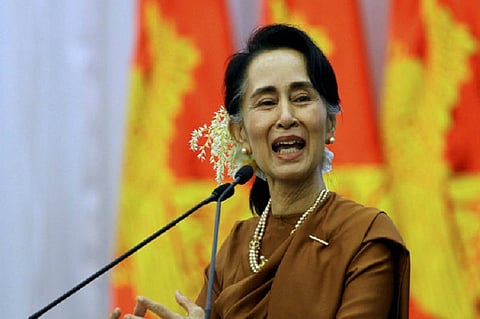

Myanmar leader Aung San Suu Kyi has addressed her nation in a hotly anticipated television address.
The 72-year-old Nobel laureate spoke about her country's crackdown on the stateless Rohingya minority, which she had so far remained silent on. Her refusal to publicly urge restraint from the military had drawn international condemnation.
Before her live broadcast address, world powers had warned Myanmar of potential action if it did not act to end the crackdown on the Rohingya minority in Rakhine state.
Suu Kyi said she "felt deeply" for the suffering of the civilians who were caught up in the conflict and that she wanted to end the suffering as soon as possible. She said Myanmar did not fear international scrutiny, but asked for their help in finding a sustainable solution to the conflict.
"We are concerned to hear the number of Muslims fleeing areas to Bangladesh," she said, condemning any "human rights violations" that may have exacerbated the crisis.
Suu Kyi promised to take action against anyone who broke the law of the land and violated human rights, but insisted that most Rohingya Muslim villages had not been affected by violence and invited diplomats to visit them.
She promised to implement the recommendations of the Annan commission delivered in August. The commission, led by former UN Secretary General Kofi Annan, looked at how to solve the sectarian tensions in the country.
The report warned against using force and to end restrictions on movement and citizenship for Rohingya people.
International outrage has grown steadily in recent weeks over a military crackdown that has led to the exodus of more than 400,000 of Myanmar's Muslim minority to neighboring Bangladesh in less than a month.
Myanmar's government has blamed the crisis on Rohingya insurgents who attacked security posts in late August. But the United Nations has described its response as "ethnic cleansing."
Last chance
On Monday, UN Secretary-General Antonio Guterres said the speech was "a last chance" for Suu Kyi to change her country's course, speaking to the BBC.
Ahead of her speech, British Foreign Secretary Boris Johnson called a meeting on sidelines of the UN attended by US Ambassador Nikki Haley and Myanmar's deputy foreign minister, as well as representatives from several other countries. Johnson warned that the violence was "a stain on the country's reputation" after its much-lauded transition to more democratic rule.
"For this reason, Burma should not be surprised to find itself under international scrutiny and on the Security Council's agenda," Johnson said, using the former British colony's earlier name.
"As I have repeatedly said, no one wants to see a return to military rule, so it is vital that Aung San Suu Kyi and the civilian government make clear these abuses must stop," he said in a statement.
Haley called Monday's meeting "productive" but voiced alarm at the lack of progress on the ground.
"The United States continues to urge the Burmese government to end military operations, grant humanitarian access and commit to aiding the safe return of civilians back to their homes," she said.
Louis Charbonneau, UN director at Human Rights Watch, called the meeting "a first step, but it can't be the last."
French Foreign Minister Jean-Yves Le Drian called for "a collective response by the international community" and "a system to try to ensure [the Rohingya's] protection."
(This article was first published on DW. You can read the original article here.)